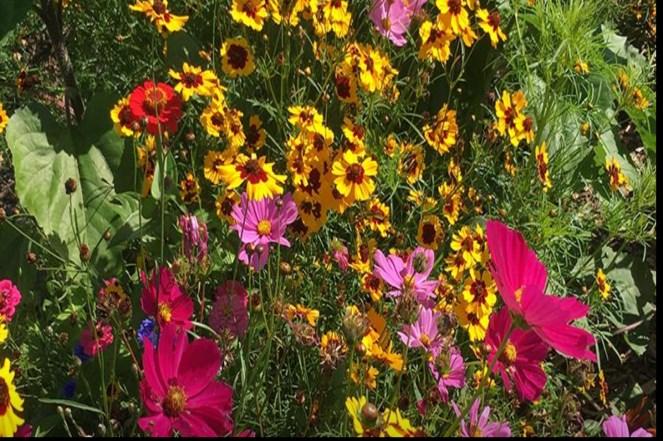
6 minute read
WARREN COUNTY CONNECTION
Heart Health
By Alyssa Anderson Extension Associate Agricultural & Human Sciences, NC State Extension, NC State University
Advertisement
February is the month of hearts, and not just because of Valentine’s Day. It is also celebrated as American Heart Month to help raise awareness of your own heart’s health. Heart disease is the leading cause of death in both men and women. Heart disease includes a variety of conditions such as heart attack, stroke, heart failure, arrhythmia, and heart valve problems. The good news is that you can make healthy changes to lower your risk of developing heart disease. To lower your risk:
Take time to be mindful and relax. Take breaks in the day to breathe deeply, enjoy your meals, and be present. Focus on positive thoughts. Take walking breaks when you find yourself feeling stressed.
• Control your cholesterol and blood pressure. Soluble fiber from fruits, vegetables, and whole grains may help in reducing cholesterol levels. Try to make half of your grains whole grains and half of your plate fruits and vegetables. The potassium in fruits and vegetables may also help in lowering blood pressure. Avoid foods high in salt due to the fact that they may increase blood pressure.
• If you drink alcohol, drink only in moderation. Moderation for men is considered one to two drinks daily and for women it is considered one drink daily. Drinking more alcohol than this has been linked to an increased risk of cancer, alcoholism, stroke, obesity, suicide, and accidents.
Cornell University Cooperative Extension of Warren County
377 Schroon River Road
Warrensburg, NY 12885
Phone: (518) 623-3291 or (518) 668-4881
Visit Our Web Site: www.cce.cornell.edu/warren
Who We Are
Nation-wide, thousands of people in each state tap into their state’s land-grant university research and know-how to make sound confident decisions concerning family, home, business, finances, and the future. In New York State, the land-grant university is Cornell University.
The Cornell Cooperative Extension network brings you the expertise of Cornell University, other land-grant universities across the country and locally-based Extension Educators, volunteers, and other experts through such programs as: horticulture, youth and families, leadership, environment, food, nutrition & health, home environment, and financial management.
Staff
John Bowe, Interim Executive Director & Associate Team Leader
Dan Carusone, 4-H Natural Resources Coordinator
Roxanne Westcott, 4-H Family Living Educator
Sharon Bellamy, Finance Manager
Amy Sabattis, Public Relations/Publications Manager
Michele Baker, Administrative Assistant
Barb Galusha, Administrative Assistant
Joe Phillips, Facilities Coordinator
Board of Directors
Jim Kneeshaw - President
David Strainer - Vice President
William Hamelin - Treasurer
CheriLyn Dempsey - Secretary
Hal Bain
Dan Bruno
Lisa Earl
Maureen Folk
Ed Griesmer
David Little
Cynthia Muratori
Cornell Administration
Danielle Hautaniemi
Extension Service Committee
Chair - Ben Driscoll
Daniel Bruno
Brad Magowan
Debra Runyon
Please visit our website for more eventswww.cce.cornell.edu/warren
Facebook & Instagram - Look for CCE Warren
February Calendar
Supporting Healthy Families - January 26 - February 23, 2023, 6:00 PM - 7:30 PM. Every parent at one time or another has questions and concerns about discipline and healthy eating for their growing children. Have you ever worried about what and how much your child is eating? Do you have a “picky eater” in your home? What about dealing with challenging behaviors? At a loss of what to do? Join educators from Cornell Cooperative Extension for the Supporting Healthy Families Program beginning Thursday, January 26, 2023 from 6:00-7:30 pm via Zoom. This five-week program combines tried and true basic parenting tools with healthy lifestyle skills. It is a unique opportunity for parents/caregivers to learn how to foster healthy relationships while learning about both discipline and nutrition. The program is free of charge and open to Essex, Warren, and Washington County parents/ caregivers. Pre-registration is required. Contact Roxanne Westcott at 518-668-4881 or rmw38@cornell.edu. This program is made possible in part with support from the Adirondack Foundation Generous Acts Grant and the Hudson Headwaters Health Foundation’s Upstream Fund.
4-H Valentine Card Making and Community Service Project - February 11, 2023, 3:00 PM - 4:00 PM - Learn how to make creative cards to share with your friends. We will also be making cards to send to a local veterans’ organization. Pre-register by contacting Michele Baker, mlb222@cornell.edu, or by phone at 518-668-4881. Crandall Library 251 Glen Street Glens Falls, NY 12801
4-H Public Presentation Help Session - February 23, 2023
11:00 AM - - Public Presentation Day is just around the corner and this zoom is for Warren County 4-H’ers who have questions or need some direction on their presentations. Contact Roxanne Westcott, rmw38@cornell.edu to register. Online Training Via Zoom CCE Warren
If you have special needs as addressed by the Americans with Disabilities Act and need assistance with attending these workshops, please make your needs known by the registration deadline. Reasonable efforts will be made for accommodations.
Habitat Plants for Pest Management
By Bonnie Kirn Donahue, University of Vermont Extension Master Gardener
Habitat plants such as cosmos and coreopsis will help attract beneficial insects to the garden. (photo: courtesy of the UVM Entomology Research Laboratory)

We spend a lot of time and energy trying to get insects out of our gardens, but what if we thought about trying to bring more in?
Prior to taking the University of Vermont (UVM) Extension Master Gardener course (www.uvm.edu/extension/ mastergardener), I got queasy around the insects I saw in my vegetable garden, assuming they were all visiting to torment me and sneak into my salad. After the course, I saw insects in a new way.
The UVM Extension entomologist taught us to ask questions first before thinking that all the insects we see are harmful. It's a practice that I follow in my garden and you should, too.
If, after careful investigation, you determine that the insects are detrimental to your plants, look first to environmentally sensitive strategies to managing the pests. One good way is with habitat plants.
These are flowering species that produce pollen and nectar, which attract and provide suitable habitats to support "good" bugs. The UVM Entomology Research Laboratory has conducted some valuable research on which flowering plant species can help attract these beneficial insects to your garden. You can read about their findings at http://go.uvm.edu/landscape-ipm
Beneficial insects like parasitic wasps (don't worry; they don't sting people), lady beetles and a wide variety of predatory insects are natural enemies to common garden pests and can help manage pest populations naturally. For example, the larvae of hoverflies, whose adult form looks similar to bees but are actually flies, feed on unwanted aphids and other soft-bodied insects.
The little red-and-black-spotted ladybug glorified in children's literature truly deserves all of the fame it has earned. One adult or immature beetle can eat 60 aphids per day, and more than 2,500 over its lifetime.
The challenge that gardeners have is how to attract these beneficial insects to their garden. The UVM researchers have tested different flowering plants, common annuals and perennials (flowers and herbs) to determine which ones are the most attractive to these insects. They evaluated several that flower throughout the season that provide a continuous source of nectar and pollen that these insects need.
Among the annuals, sweet alyssum (Lobularia maritime) was found to be particularly appealing to beneficial insects, but others like zinnias, sunflowers (Helianthus), dill (Anethum graveolens), cosmos, coreopsis, blue cornflowers (Centaurea cyanus), yellow marigolds (Tagetes patula 'Little Hero Yellow') and Indian blanket (Gaillardia pulchella) also were effective.
Many commercial growers use these plants to reduce their pest problems without resorting to insecticides. Home gardeners can try these, too, and even experiment with other plant species to see which work the best for their garden.
You can purchase many common annuals and perennials, including alyssum, zinnias, coreopsis, marigolds and Indian blanket at many local greenhouses or start them from seed indoors to maximize the amount of time they are flowering. Dill, sunflowers, cosmos and blue cornflowers can be sowed directly from seed.
Plant these habitat plants in your garden beds among your vegetables or in a mixed variety hedge-like row around the garden. They also do well in containers and can be planted just as you would other decorative annual flowers.
To keep beneficial insects happy, it is important that the plants flower continuously and remain healthy through the season. Annuals will need at least six hours of sunlight a day and adequate water.
Deadhead spent flowers often to encourage more blooms. It is better to have fewer healthy habitat plants than many unhealthy ones, so don't plant more than you have time to care for.
Since learning about this method of pest control, I have experimented with these plantings and have found that they make my vegetable garden more remarkable than I could have imagined. The dill, zinnias and sunflowers practically pulse with insect activity in addition to being striking accents in my vegetable beds. I have found that it is as satisfying to watch insects enjoy my plants as it is to watch birds and people enjoy them.






